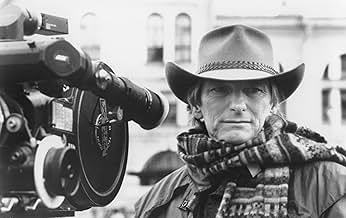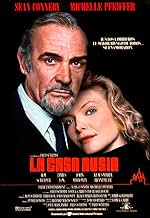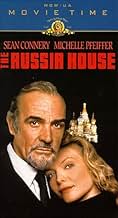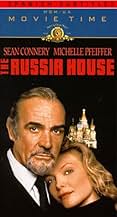VALUTAZIONE IMDb
6,1/10
18.949
LA TUA VALUTAZIONE
Un editore britannico espatriato si ritrova inaspettatamente a lavorare per i servizi segreti britannici per indagare sulle persone in Russia.Un editore britannico espatriato si ritrova inaspettatamente a lavorare per i servizi segreti britannici per indagare sulle persone in Russia.Un editore britannico espatriato si ritrova inaspettatamente a lavorare per i servizi segreti britannici per indagare sulle persone in Russia.
- Regia
- Sceneggiatura
- Star
- Premi
- 1 vittoria e 5 candidature totali
Ian McNeice
- Merrydew
- (as Ian McNiece)
Peter Marinker
- U.S. Scientist
- (as Peter Mariner)
Recensioni in evidenza
My first comment for this site....exciting stuff.
Prompted to write this by seeing this again on video - the third time for me, and it's rare that I want to see anything three times. And I realized that it's fascination still holds....this is one of my top 10, definitely.
The reasons I would rate this a "9", while somebody else would give it a "5.9" are largely personal....i think it always comes down to the personal. Talk all we want, when we watch a movie - as when we eat a meal, or kiss someone - the pleasure center in the brain either lights up or doesn't. For me it's all about the love of a place...for Scott Barley Blair it's early Glastnost Russia, for me it's 90's Germany - Hamburg, Berlin...the strangeness, the trueness of people who surround you in such a place and your love for them because of this. The fact that a film can light up specific sense memories like these means that it is true - at least in that respect. This is a remarkably honest film - terrifically unsensational for a spy film and one of the rare "love stories" that delivers the satisfactions expected of a "love story" without getting mawkish. Everything rings true here except for the ending (a fabricated "happy ending" which is the only thing that kept me from rating this a 10).
To ask for Manchurian Candidate type excitement from this low key film is wrong. The suspense, which is remarkably sustained (those rich long tracking shots of people walking through public places to uncertain destinations to meet with, or maybe not meet with shadow characters who may be allies or enemies) is the truer suspense of the uncertainty of living in a gray, gray world...where nothing much happens, but peril is part of the fabric of mundane life.
(Those sequences are gorgeous....the colors of autumn in a Leningrad park, the closeups of the stone gargoyles....the moody circular stepping pace of the soundtrack....Branford Marsalis' saxophone.) Someone has said here that it is talky. Yes, it is talky...but the talk is brilliant...it is the perfect reflection of a world where everyone - book publishers and bureaucrats and spies alike speaks in mannered, ritualized streams of code. This is not disinformation - it is perfectly understood by all, a language that has supplanted the language of an earlier age in which sincerity was an option.
Besides that ending, the piece is perfectly faithful to LeCarre's novel. LeCarre's books have had good luck when being translated into movies. Of the eight or so that have been adapted, four have made great films: The Spy Who Came into the Cold, The Russia House, and the two George Smiley BBC miniseries. LeCarre is a great writer and more specifically great at plotting and dialogue, and these films all succeed pretty much by filming what is written unadorned and pouring on the atmosphere. And they are blessed with lead performances by three great actors at the top of the form - Richard Burton, Sean Connery and Alec Guiness (Guiness especially...to watch him for six hours in Smiley's People is one of the great pleasures).
A beautifully efficient and elegant translation by Tom Stoppard of a great novel, wonderfully dignified and touching performances by Connery and Michelle Pfeiffer (never seen her better), a beautiful soundtrack by a second tier composer graced by the presence of a real jazz master, a terrific evocation of a place and time....a very moving film.
Prompted to write this by seeing this again on video - the third time for me, and it's rare that I want to see anything three times. And I realized that it's fascination still holds....this is one of my top 10, definitely.
The reasons I would rate this a "9", while somebody else would give it a "5.9" are largely personal....i think it always comes down to the personal. Talk all we want, when we watch a movie - as when we eat a meal, or kiss someone - the pleasure center in the brain either lights up or doesn't. For me it's all about the love of a place...for Scott Barley Blair it's early Glastnost Russia, for me it's 90's Germany - Hamburg, Berlin...the strangeness, the trueness of people who surround you in such a place and your love for them because of this. The fact that a film can light up specific sense memories like these means that it is true - at least in that respect. This is a remarkably honest film - terrifically unsensational for a spy film and one of the rare "love stories" that delivers the satisfactions expected of a "love story" without getting mawkish. Everything rings true here except for the ending (a fabricated "happy ending" which is the only thing that kept me from rating this a 10).
To ask for Manchurian Candidate type excitement from this low key film is wrong. The suspense, which is remarkably sustained (those rich long tracking shots of people walking through public places to uncertain destinations to meet with, or maybe not meet with shadow characters who may be allies or enemies) is the truer suspense of the uncertainty of living in a gray, gray world...where nothing much happens, but peril is part of the fabric of mundane life.
(Those sequences are gorgeous....the colors of autumn in a Leningrad park, the closeups of the stone gargoyles....the moody circular stepping pace of the soundtrack....Branford Marsalis' saxophone.) Someone has said here that it is talky. Yes, it is talky...but the talk is brilliant...it is the perfect reflection of a world where everyone - book publishers and bureaucrats and spies alike speaks in mannered, ritualized streams of code. This is not disinformation - it is perfectly understood by all, a language that has supplanted the language of an earlier age in which sincerity was an option.
Besides that ending, the piece is perfectly faithful to LeCarre's novel. LeCarre's books have had good luck when being translated into movies. Of the eight or so that have been adapted, four have made great films: The Spy Who Came into the Cold, The Russia House, and the two George Smiley BBC miniseries. LeCarre is a great writer and more specifically great at plotting and dialogue, and these films all succeed pretty much by filming what is written unadorned and pouring on the atmosphere. And they are blessed with lead performances by three great actors at the top of the form - Richard Burton, Sean Connery and Alec Guiness (Guiness especially...to watch him for six hours in Smiley's People is one of the great pleasures).
A beautifully efficient and elegant translation by Tom Stoppard of a great novel, wonderfully dignified and touching performances by Connery and Michelle Pfeiffer (never seen her better), a beautiful soundtrack by a second tier composer graced by the presence of a real jazz master, a terrific evocation of a place and time....a very moving film.
The Russia House is a superior spy romance movie which falls short of being great. Additionally a couple of factors have been unkind to it over time.
Connery and Pfeiffer are excellant; the large cast are almost uniformly outstanding (except perhaps Roy Scheider, who I usually like, but who seems a bit over the top in his role here); the Moscow scenery and end of the Cold War feel are great, and the main characters are easy to like, if difficult to outright love. On the down side the writing assumes too much in expecting the audience to stay on top of the espionage jargon and intrigue, added to the non-linear plot. Let your attention wander and you'll lose your way. If it had been a little easier to follow, it would have left more room for dramatic tension, which was adequate but seldom riveting.
When I said that time has been unkind to The Russia House, I meant two things: firstly that the unfortunate timing of the movie's release, a year before the collapse of the Soviet Union, ensured that it would be dated almost immediately. More significantly, a growing portion of the film's potential audience didn't live through the late Soviet Era, and the nuances of concepts like Glasnost, and why Perestroika makes it hard for Pfeiffer to do her shoe-shopping aren't going to mean a thing to anyone much under 30.
But that's not the movie's fault. Russia House is still a quality, enjoyable drama with a great cast, even if it's somewhat ponderous and slow-moving, and complex. And oh yes - it has James Fox. A film like this without James Fox would have been like a table with three legs.
7 out of 10
Connery and Pfeiffer are excellant; the large cast are almost uniformly outstanding (except perhaps Roy Scheider, who I usually like, but who seems a bit over the top in his role here); the Moscow scenery and end of the Cold War feel are great, and the main characters are easy to like, if difficult to outright love. On the down side the writing assumes too much in expecting the audience to stay on top of the espionage jargon and intrigue, added to the non-linear plot. Let your attention wander and you'll lose your way. If it had been a little easier to follow, it would have left more room for dramatic tension, which was adequate but seldom riveting.
When I said that time has been unkind to The Russia House, I meant two things: firstly that the unfortunate timing of the movie's release, a year before the collapse of the Soviet Union, ensured that it would be dated almost immediately. More significantly, a growing portion of the film's potential audience didn't live through the late Soviet Era, and the nuances of concepts like Glasnost, and why Perestroika makes it hard for Pfeiffer to do her shoe-shopping aren't going to mean a thing to anyone much under 30.
But that's not the movie's fault. Russia House is still a quality, enjoyable drama with a great cast, even if it's somewhat ponderous and slow-moving, and complex. And oh yes - it has James Fox. A film like this without James Fox would have been like a table with three legs.
7 out of 10
I have read a few John Le Carre books (although not The Russia House) and was not as impressed as most other people seemed to be. People say that the movie is slow and cerebral (and it is) but really that is how Le Carre's books read. Sean Connery never puts in a bad performance, and neither does Michelle Pfeiffer. And it never hurts that she is sooooo beautiful. Klaus Maria Brandauer is also always good and still is here. The problem is the script, which relates back to the source material. It is a little bit of a bore. Not badly, just a bit. It looks like the filmmakers were so proud to be filming in the USSR, that they went a little overboard. Not every place in Russia is St. Basil's and the Winter Palace. Overall the film is OK.
Based on John le Carré's novel of the same name, 'The Russia House' offers Fine Performances, but as a film, its plain ordinary. It does have some captivating moments, but overall, the slow pace & a half-baked Adapted Screenplay, act as a disadvantage.
'The Russia House' Synopsis: An expatriate British publisher unexpectedly finds himself working for British intelligence to investigate people in Russia.
'The Russia House' begins nicely, but loses momentum after 45-minutes into the film. Sure, the second-hour has some interesting moments, but the Writing isn't striking. The Climax, however, works. Tom Stoppard's Adapted Screenplay isn't without merit, but is flawed as well. Also, the slow-pace left me restless at times. Fred Schepisi's Direction is skilled & well-done. Cinematography is excellent. Editing is fair.
Performance-Wise: Sir Sean Connery, with a flawless Russian accent, is in good form. Michelle Pfeiffer, also with a superbly picked-up Russian accent, is natural to the core. Roy Scheider is flawless. He stands out. James Fox is effective. Klaus Maria Brandauer is terrific in a small, but significant role.
On the whole, 'The Russia House' could've been so much more.
'The Russia House' Synopsis: An expatriate British publisher unexpectedly finds himself working for British intelligence to investigate people in Russia.
'The Russia House' begins nicely, but loses momentum after 45-minutes into the film. Sure, the second-hour has some interesting moments, but the Writing isn't striking. The Climax, however, works. Tom Stoppard's Adapted Screenplay isn't without merit, but is flawed as well. Also, the slow-pace left me restless at times. Fred Schepisi's Direction is skilled & well-done. Cinematography is excellent. Editing is fair.
Performance-Wise: Sir Sean Connery, with a flawless Russian accent, is in good form. Michelle Pfeiffer, also with a superbly picked-up Russian accent, is natural to the core. Roy Scheider is flawless. He stands out. James Fox is effective. Klaus Maria Brandauer is terrific in a small, but significant role.
On the whole, 'The Russia House' could've been so much more.
In a nutshell: a Russian missile scientist, nicknamed Danté offers an obscure Brit publisher, Barley Blair, data that shows Russian missiles are junk.
The '8' is my old rating-I might revise this to 9 or 10 after a fresh viewing. Here's why: 1. I believe le Carré must have had Connery in mind for the lead character, Barley Blair. Truth is: Connery was born to play this role-no one else comes to mind. Barley is a drinker, publisher, philosopher at large. A bit of an anarchist, but firmly non-political. A jazz clarinetist who likes to gab about dreams of world peace-but he really does NOT want to get involved in the process. Connery is perfect.
2. Filmed partially in Russia, the scenery of Moscow & Leningrad is spectacular! This was an early (1990) production with Russian cooperation.
3. Tremendous supporting cast: Roy Scheider (from'Jaws') as Russel Sheridan, the chief agent for US Intelligence, has to play a character of many qualities, above all, an optimist for truly ending the Cold War. When things don't go as expected, he tells the team, 'Put the stools on the bar-TIL next time'. Honorable mention: John Mahoney as 'Brady', the super spy who has the ear of all the American higher-ups, including the President (in the book, Brady is given godlike status-note what he says about the 'deal' being offered by Danté.). And many others! Nice to see a young Martin Clunes as an orderly-long before his Doc Martin days.
4. Not an action film, no sex scenes but some harsh language-but, basically a dramatic study of the Cold War's conclusion. Carré was correct in pondering that even if the USSR missile system lagged way behind the Allied side, would the USA put thousands out of work by shutting down their production?
5. Fabulous irony. Danté tells Blair that 'the men in grey suits came to get his father, & they will come to get you, too!' Barley, like us, is reluctant to accept the notion that the 'good guys' are just as ruthless, but consider how strongly the Americans suspect Blair of complicity, when all indicators show that he is just not interested in money nor political matters.
The '8' is my old rating-I might revise this to 9 or 10 after a fresh viewing. Here's why: 1. I believe le Carré must have had Connery in mind for the lead character, Barley Blair. Truth is: Connery was born to play this role-no one else comes to mind. Barley is a drinker, publisher, philosopher at large. A bit of an anarchist, but firmly non-political. A jazz clarinetist who likes to gab about dreams of world peace-but he really does NOT want to get involved in the process. Connery is perfect.
2. Filmed partially in Russia, the scenery of Moscow & Leningrad is spectacular! This was an early (1990) production with Russian cooperation.
3. Tremendous supporting cast: Roy Scheider (from'Jaws') as Russel Sheridan, the chief agent for US Intelligence, has to play a character of many qualities, above all, an optimist for truly ending the Cold War. When things don't go as expected, he tells the team, 'Put the stools on the bar-TIL next time'. Honorable mention: John Mahoney as 'Brady', the super spy who has the ear of all the American higher-ups, including the President (in the book, Brady is given godlike status-note what he says about the 'deal' being offered by Danté.). And many others! Nice to see a young Martin Clunes as an orderly-long before his Doc Martin days.
4. Not an action film, no sex scenes but some harsh language-but, basically a dramatic study of the Cold War's conclusion. Carré was correct in pondering that even if the USSR missile system lagged way behind the Allied side, would the USA put thousands out of work by shutting down their production?
5. Fabulous irony. Danté tells Blair that 'the men in grey suits came to get his father, & they will come to get you, too!' Barley, like us, is reluctant to accept the notion that the 'good guys' are just as ruthless, but consider how strongly the Americans suspect Blair of complicity, when all indicators show that he is just not interested in money nor political matters.
Lo sapevi?
- QuizThe meaning and relevance of the title "The Russia House" is that it refers to the nickname given to the section of the British Secret Service that was assigned to investigating the Soviet Union.
- BlooperDuring Blair's "start the avalanche" speech, Dante is seen at the end of the table. As the camera pans around the table during the speech, Dante disappears from the end of the table, and then reappears.
- Curiosità sui creditiThe credits appear over a series of clips showing location shots from the film, concluding with a repeat of the final scene.
- ConnessioniFeatured in A Tribute to Sean Connery (1990)
I più visti
Accedi per valutare e creare un elenco di titoli salvati per ottenere consigli personalizzati
Dettagli
- Data di uscita
- Paese di origine
- Sito ufficiale
- Lingue
- Celebre anche come
- The Russia House
- Luoghi delle riprese
- Lisbona, Portogallo(on location)
- Aziende produttrici
- Vedi altri crediti dell’azienda su IMDbPro
Botteghino
- Budget
- 21.800.000 USD (previsto)
- Lordo Stati Uniti e Canada
- 22.997.992 USD
- Fine settimana di apertura Stati Uniti e Canada
- 4.435.650 USD
- 25 dic 1990
- Lordo in tutto il mondo
- 22.997.992 USD
Contribuisci a questa pagina
Suggerisci una modifica o aggiungi i contenuti mancanti

Divario superiore
By what name was La casa Russia (1990) officially released in India in Hindi?
Rispondi





































